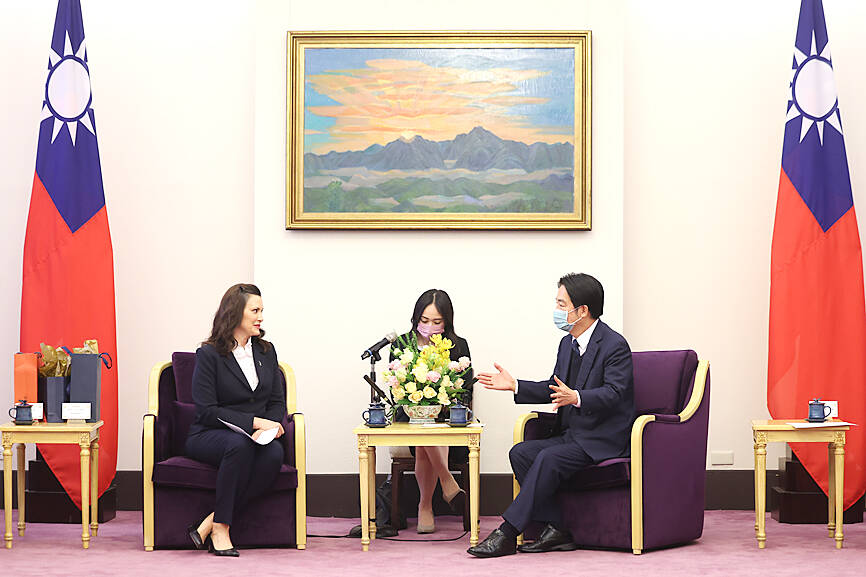Michigan Governor Gretchen Whitmer yesterday announced the opening of an office in Taiwan to encourage Taiwanese investment in the US state and bolster economic ties with Taiwan.
Whitmer, who is visiting Taiwan for the second time in six months, told a news conference in Taipei that she is looking forward to having “thoughtful, longer-term conversations” with Taiwanese businesses to further enhance cooperation.
During her delegation’s two-day trip, the governor is to host the opening reception of the office, which is “an extension of a partnership that is built over years” between Taiwan and Michigan, she said.

Photo: CNA
The state is always exploring opportunities to expand cooperation that is mutually beneficial to Taiwan and Michigan, she added.
Beginning with two to three staff, the office could be expanded as demand warrants, Michigan Economic Development Corp (MEDC) chief executive officer Quentin Messer Jr said.
Through the two visits and efforts in between, the state is “slowly building a trust relationship” with Taiwan, hoping to demonstrate to Taiwanese businesses the importance Michigan attaches to economic ties with the nation, Messer said.
The state is particularly focused on cooperation in semiconductors, clean technology, mobility innovation, and defense and aerospace innovation, he said.
Taiwan’s expertise in semiconductors and clean energy would benefit Michigan’s economy, whose backbone is in manufacturing, Whitmer said.
“Learning from and working with Taiwanese companies is crucial for our success,” she said.
Michigan has a history of welcoming foreign direct investment, especially from Asian nations, in the innovation and mobility sector, Messer said.
“There is an appetite and a desire” to welcome more investment under the support of the administration that is committed to facilitating the process, he added.
Small and medium-sized Michigan manufacturers and businesses are looking to invest in Taiwan, frequently sending delegations to the nation to “connect with Taiwanese customers,” he said.
The state is not only seeking to deepen commercial ties with Taiwan through the new office, but also cultural, educational and people-to-people relations, he said.
Later yesterday, the delegation met with Vice President William Lai (賴清德), who thanked Michigan for its long-term support for the nation, such as through the passage of Taiwan-friendly bills in the state legislature.
The opening of the office would greatly benefit economic and trade cooperation between Taiwan and Michigan, Lai said, adding that he hoped to see a win-win outcome achieved through the partnership of Taiwan’s semiconductor industry and Michigan’s auto industry.
The delegation is to meet with President Tsai Ing-wen (蔡英文) this morning, Presidential Office spokeswoman Lin Yu-chan (林聿禪) said.
The Michigan Senate and Michigan House of Representatives established cross-party Taiwan Friendship Caucuses in March 2022 and passed resolutions in support of Taiwan in 2022 and last year, Lin said.
Taiwan and Michigan have enhanced cooperation in semiconductors, electric vehicles and artificial intelligence in the past few years, Lin said, adding that Taiwan hopes to deepen educational cooperation and exchanges with the state.

CHAOS: Iranians took to the streets playing celebratory music after reports of Khamenei’s death on Saturday, while mourners also gathered in Tehran yesterday Iranian Supreme Leader Ayatollah Ali Khamenei was killed in a major attack on Iran launched by Israel and the US, throwing the future of the Islamic republic into doubt and raising the risk of regional instability. Iranian state television and the state-run IRNA news agency announced the 86-year-old’s death early yesterday. US President Donald Trump said it gave Iranians their “greatest chance” to “take back” their country. The announcements came after a joint US and Israeli aerial bombardment that targeted Iranian military and governmental sites. Trump said the “heavy and pinpoint bombing” would continue through the week or as long

TRUST: The KMT said it respected the US’ timing and considerations, and hoped it would continue to honor its commitments to helping Taiwan bolster its defenses and deterrence US President Donald Trump is delaying a multibillion-dollar arms sale to Taiwan to ensure his visit to Beijing is successful, a New York Times report said. The weapons sales package has stalled in the US Department of State, the report said, citing US officials it did not identify. The White House has told agencies not to push forward ahead of Trump’s meeting with Chinese President Xi Jinping (習近平), it said. The two last month held a phone call to discuss trade and geopolitical flashpoints ahead of the summit. Xi raised the Taiwan issue and urged the US to handle arms sales to

BIG SPENDERS: Foreign investors bought the most Taiwan equities since 2005, signaling confidence that an AI boom would continue to benefit chipmakers Taiwan Semiconductor Manufacturing Co’s (TSMC, 台積電) market capitalization swelled to US$2 trillion for the first time following a 4.25 percent rally in its American depositary receipts (ADR) overnight, putting the world’s biggest contract chipmaker sixth on the list of the world’s biggest companies by market capitalization, just behind Amazon.com Inc. The site CompaniesMarketcap.com ranked TSMC ahead of Saudi Aramco and Meta Platforms Inc. The Taiwanese company’s ADRs on Tuesday surged to US$385.75 on the New York Stock Exchange, as strong demand for artificial intelligence (AI) applications led to chip supply constraints and boost revenue growth to record-breaking levels. Each TSMC ADR represents

Pro-democracy media tycoon Jimmy Lai’s (黎智英) fraud conviction and prison sentence were yesterday overturned by a Hong Kong court, in a surprise legal decision that comes soon after Lai was jailed for 20 years on a separate national security charge. Judges Jeremy Poon (潘兆初), Anthea Pang (彭寶琴) and Derek Pang (彭偉昌) said in the judgement that they allowed the appeal from Lai, and another defendant in the case, to proceed, as a lower court judge had “erred.” “The Court of Appeal gave them leave to appeal against their conviction, allowed their appeals, quashed the convictions and set aside the sentences,” the judges